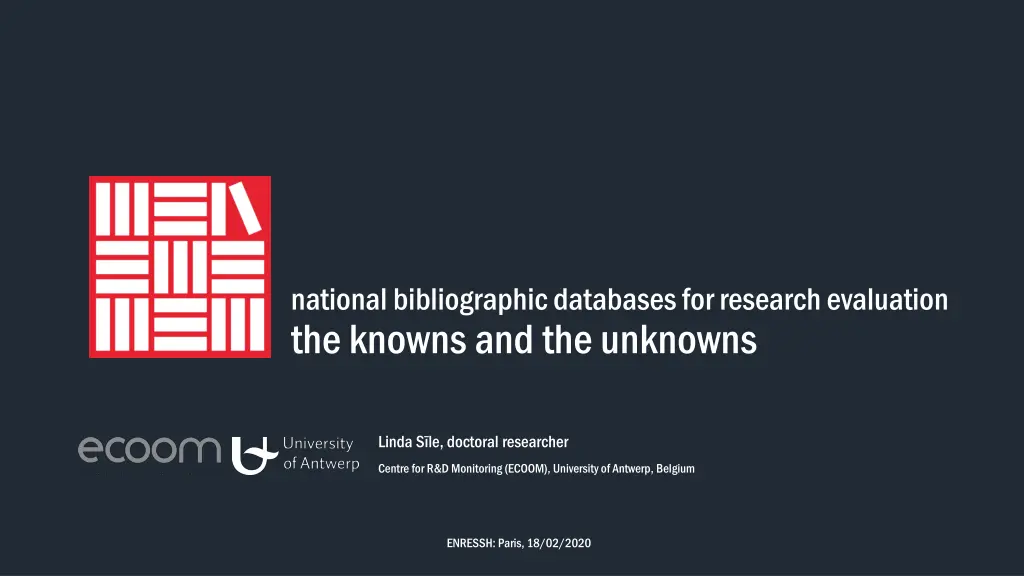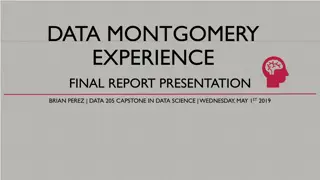
Exploring National Bibliographic Databases for Research Evaluation
Discover the landscape of national bibliographic databases for research evaluation, examining known databases such as RIV, VABB-SHW, and CRISTIN, along with challenges like data model discrepancies. Learn about reliable data collection methods, valid database records, and the importance of government endorsement for database implementation.
Download Presentation

Please find below an Image/Link to download the presentation.
The content on the website is provided AS IS for your information and personal use only. It may not be sold, licensed, or shared on other websites without obtaining consent from the author. If you encounter any issues during the download, it is possible that the publisher has removed the file from their server.
You are allowed to download the files provided on this website for personal or commercial use, subject to the condition that they are used lawfully. All files are the property of their respective owners.
The content on the website is provided AS IS for your information and personal use only. It may not be sold, licensed, or shared on other websites without obtaining consent from the author.
E N D
Presentation Transcript
national bibliographic databases for research evaluation the knowns and the unknowns Linda S le, doctoral researcher Centre for R&D Monitoring (ECOOM), University of Antwerp, Belgium ENRESSH: Paris, 18/02/2020
2016 ENRESSH meeting in Poznan Presentations of 6 European databases: - RIV in the Czech Republic - VABB-SHW in Flanders, Belgium - CRISTIN in Norway - VIRTA in Finland - BFI in Denmark - Lituanistika in Lithuania
Greennational database exists Blue national database under implemented Grey no national database White no information Data from the survey (2017*) *Partially updated on 2020
Definition Bibliographic database for research output is a structured set of bibliographic metadata (e.g. title, type, year, and author) of artifacts authored by researchers
Database for research evaluation Valid database records refer to existing research output Comprehensive database represents the total volume of the (social sciences and humanities) research output of a country Reliable data collection and registration method provides accurate and traceable information Endorsed by government the implementation and maintenance of a database is embedded in a legal framework at the national level
VIRTA-ENRESSH pilot The main challenge is that institutional and national data sources use different data models as well as different data collection and validation procedures. (Puuska et al. 2018)
Databases as mirrors of research
Thank you! Linda.Sile@uantwerpen.be
Presentation based on Puuska, H.-M., Guns, R., P l nen, J., Sivertsen, G., Ma ana-Rodr guez, J., & Engels, T. (2018). Proof of concept of a European database for social sciences and humanities publications: Description of the VIRTA-ENRESSH pilot (p. 23). CSC & ENRESSH. https://doi.org/10.6084/M9.FIGSHARE.5993506 S le, L., Guns, R., Ivanovi , D., P l nen, J., & Engels, T. C. E. (2019). Creating and maintaining a national bibliographic da- tabase for research output: Manual of good practices. ENRESSH & ECOOM. https://doi.org/10.6084/m9.figshare.9989204 S le, L., P l nen, J., Sivertsen, G., Guns, R., Engels, T. C. E., Arefiev, P., Teitelbaum, R. (2018). Comprehensiveness of national bibliographic databases for social sciences and humanities: findings from a European survey. Research Evaluation. https://doi.org/10.1093/reseval/rvy016 S le, L., Guns, R., Sivertsen, G., & Engels, T. C. E. (2017). European Databases and Repositories for Social Sciences and Humanities Research Output (p. 25). Antwerp: ECOOM & ENRESSH. Retrieved from https://doi.org/10.6084/m9.figshare.5172322.v2



















